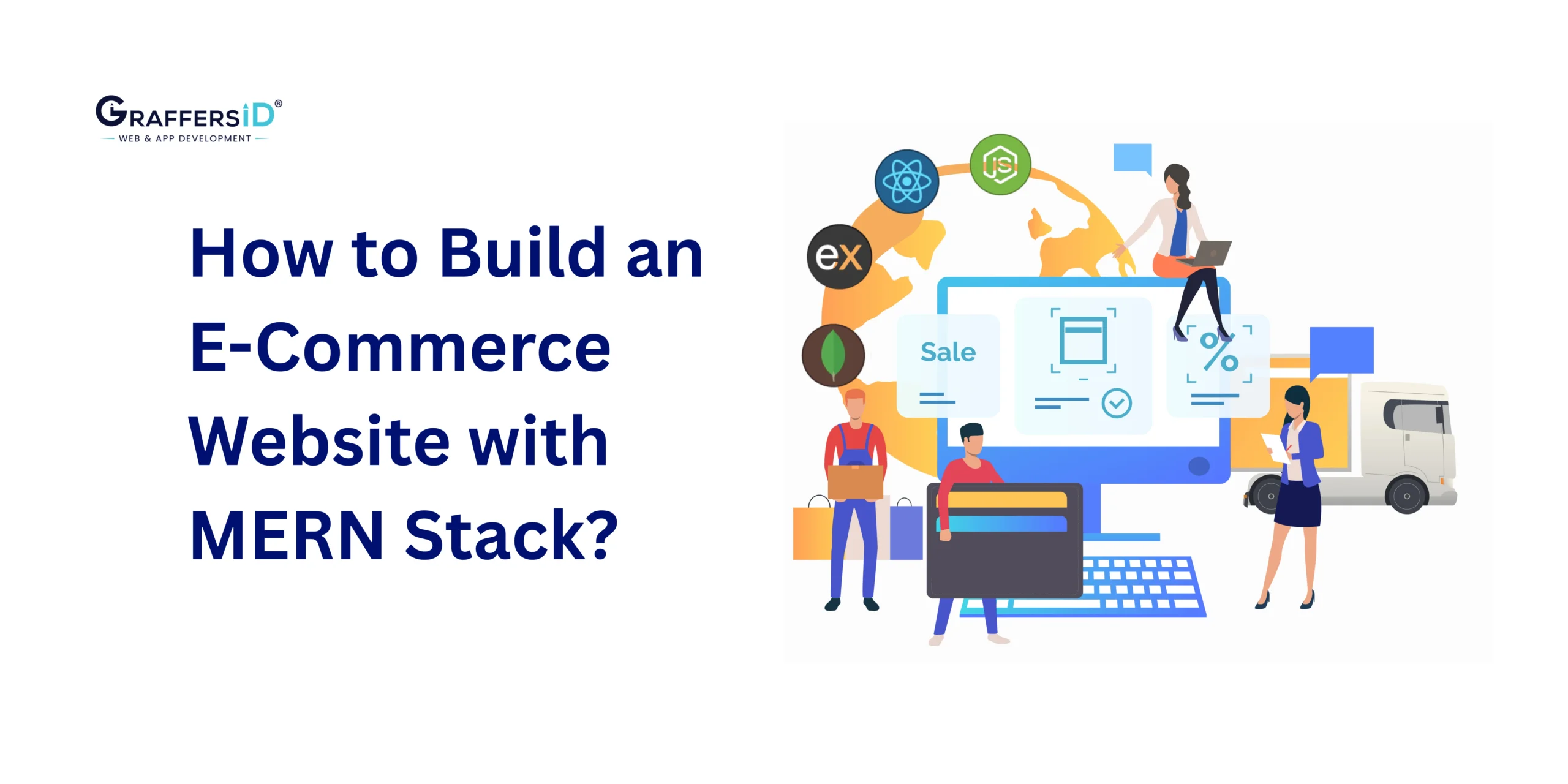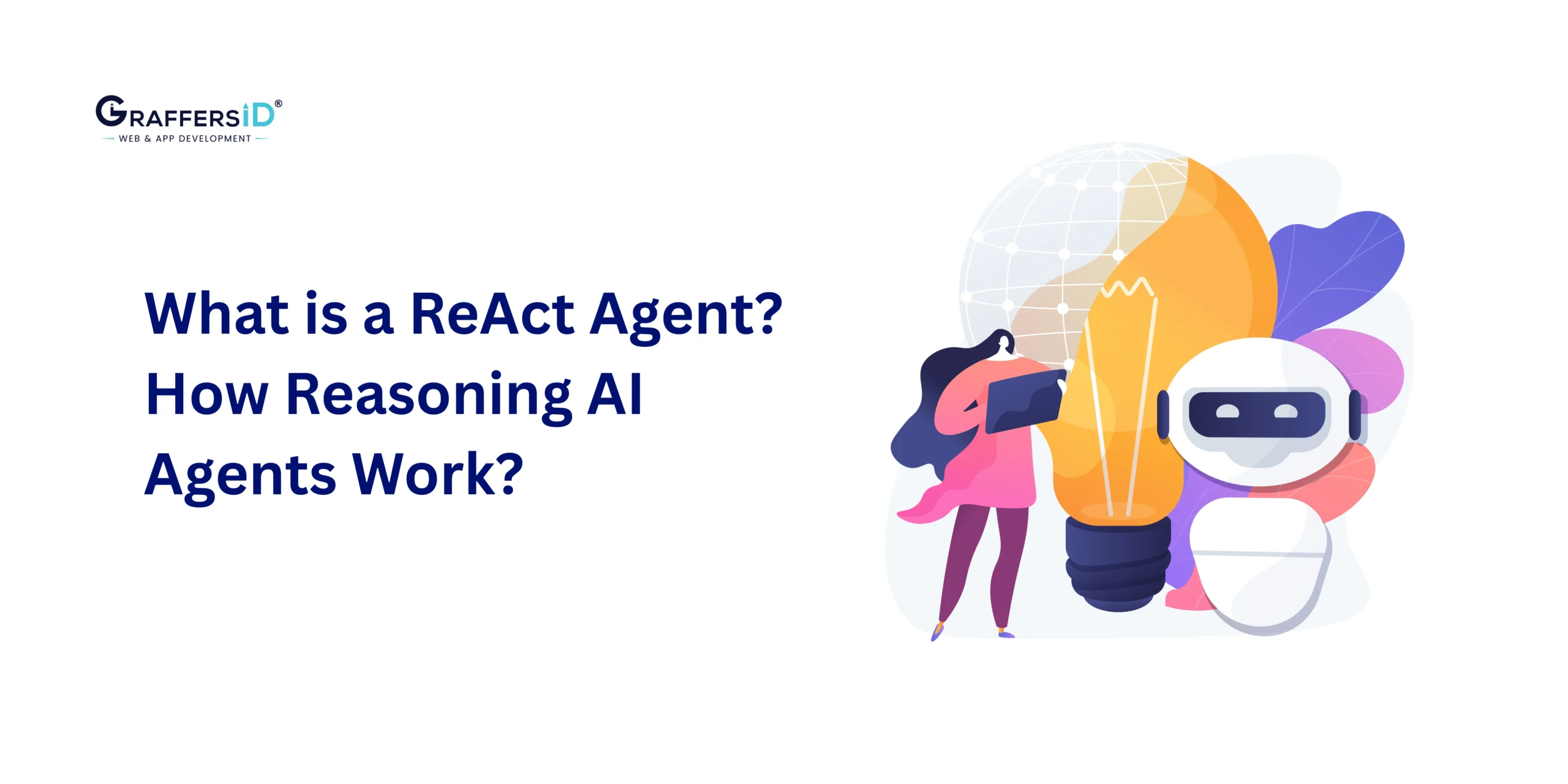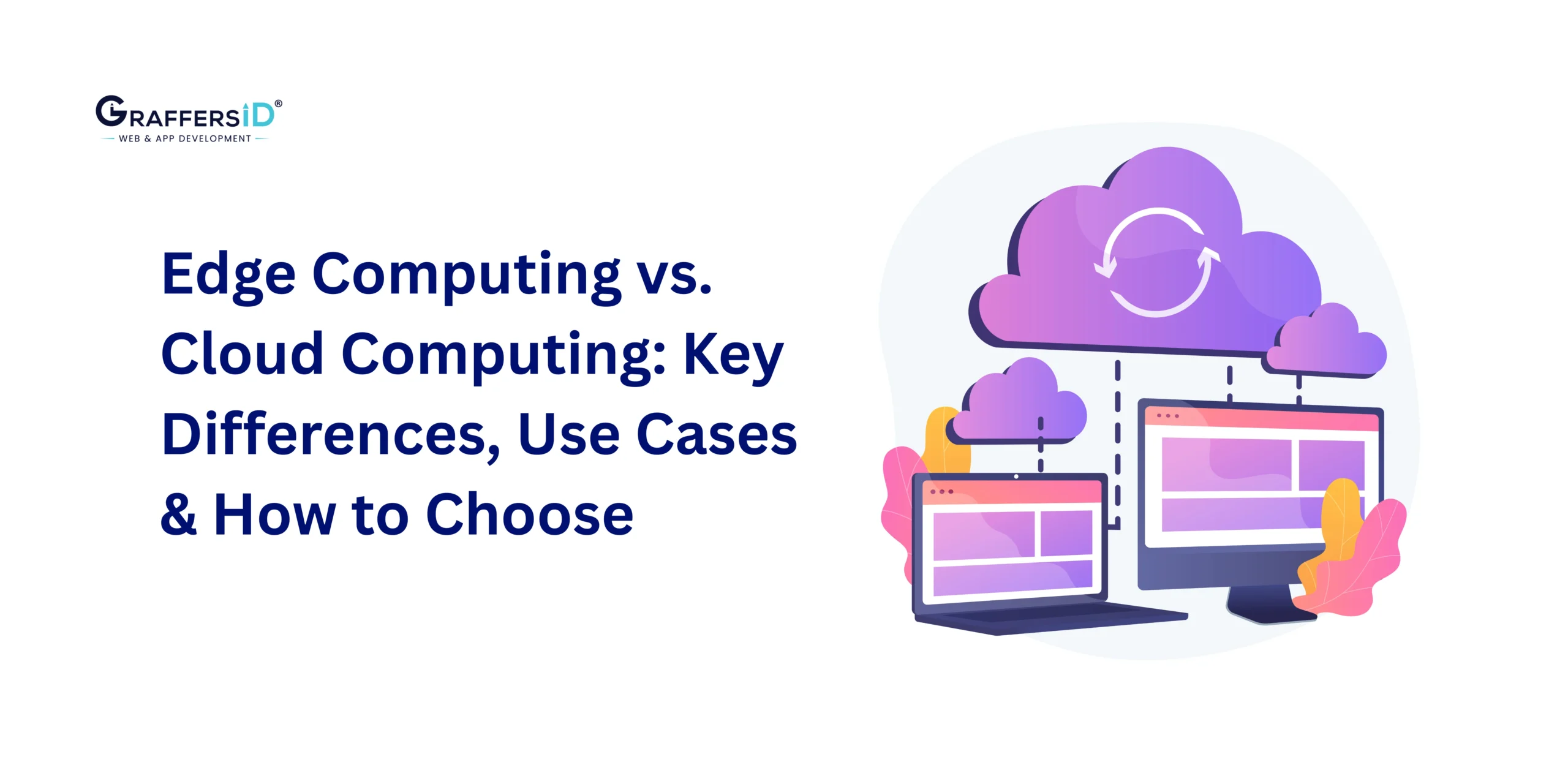The global e-commerce market is set to surpass $8 trillion in 2026, and businesses, whether emerging startups or established enterprises, need fast, scalable, and AI-ready platforms to stay ahead of the competition. Traditional technology stacks often fall short when it comes to real-time performance, seamless integrations, and personalized user experiences.
Comes the MERN stack (MongoDB, Express.js, React.js, Node.js), a full-stack JavaScript solution that empowers developers to build dynamic, high-performance e-commerce websites with AI capabilities, real-time updates, and secure transactions.
In this guide, you’ll discover why the MERN stack is the ideal choice for modern e-commerce, how to design scalable, future-proof architectures, integrate AI-driven personalization and automation, and implement best practices for checkout, payment, and security, all optimized for 2026.
Why MERN Stack Is the Best Choice for Building E-Commerce Websites in 2026?
Modern e-commerce websites demand real-time product updates, AI-driven personalization, and scalable infrastructure. The MERN stack fits perfectly because:
-
MongoDB: Handles large, dynamic product catalogs with flexible schema.
-
Express.js: Simplifies backend APIs for secure, fast data exchange.
-
React.js: Builds dynamic, SEO-friendly, and AI-integrated frontends.
-
Node.js: Ensures high performance and scalability for concurrent users.
Read Also: How to set up Automated Customer Support and Service?
Key Features Every E-Commerce Website Needs in 2026
Every successful e-commerce platform needs core features powered by modern technologies:
-
Product Management: AI-driven recommendations, smart categorization, and bulk uploads.
-
User Authentication: Role-based access with passwordless login and biometric support.
-
Shopping Cart & Checkout: One-click checkout, AI-driven cart reminders, and payment flexibility.
-
Order Management: Real-time tracking with predictive shipping estimates.
-
Scalability: Cloud-native scaling with Node.js clusters and MongoDB sharding.
| Feature | MERN Advantage |
| Real-Time Inventory | MongoDB supports fast, dynamic inventory updates |
| Personalized UI | React.js enables AI-based recommendations and dynamic pages |
| High Performance | Node.js handles 1000s of concurrent transactions |
| Customization | Full-stack JavaScript makes integration smooth |
How to Design a Scalable E-Commerce Architecture with MERN Stack?
Handling millions of visitors and transactions requires a future-proof architecture.
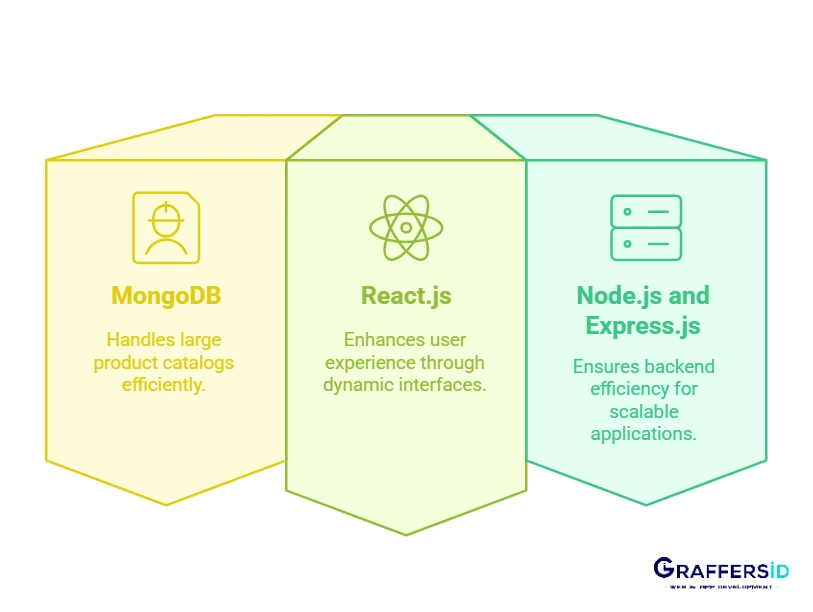
1. MongoDB: Managing Product Catalogs at Scale
MongoDB in the MERN stack is used for handling large product catalogs when building an e-commerce website. It is a NoSQL database that stores data in flexible JSON-like documents. With this structure, it is ideal for e-commerce platforms since product attributes like price, descriptions, images, and stock levels can vary significantly.
Best Practices for Using MongoDB in E-Commerce
- Sharding for distributed product data.
- Indexing for faster searches.
- Caching with Redis for frequently accessed data.
2. React.js: Delivering Fast & Personalized Shopping
With ReactJS, you can build fast, interactive, and responsive UI, which is exactly what e-commerce websites need. You can build highly dynamic product pages, shopping carts, and category filters, which enhance the user experience.
Benefits of React.js for E-commerce:
- Reusable components for product cards, carts, and filters.
- State Management (Redux/Zustand) for real-time cart and order updates.
- Next.js SSR/ISR for SEO optimization and faster rendering.
- AI-powered personalization, product recommendations, and upselling.
3. Node.js + Express.js: Efficient and Secure Backend
By using Node.js, you can perform non-blocking I/O operations, which makes it perfect for handling concurrent requests in an e-commerce website. Express.js, which is a lightweight framework for Node.js, helps in making API routes clean and efficient.
Recommended practices for backend development:
- GraphQL APIs for optimized data queries.
- REST APIs for microservices and integrations.
- Middleware Security (Helmet.js, rate-limiting, CSRF protection).
- Integration with AI services for fraud detection and demand forecasting.
How to Integrate Secure Checkout and Payment Gateways in MERN E-Commerce: 2026 Guide
A smooth checkout experience directly impacts conversion rates.
Best Practices for a Smooth Checkout Experience
- Guest Checkout: Since creating an account takes a few minutes, customers lose interest and exit the site. Provide an option to purchase without creating an account.
- Multiple Payment Methods: Provide multiple options for payment, including COD, credit cards, PayPal, Apple Pay, and digital wallets.
- AI-Powered Auto-Fill: Integrate auto-fill of address, which minimizes manual input errors and, in return, enhances user experience.
- Real-Time Tax & Shipping APIs: APIs like TaxJar can be used for the automatic calculation of tax applied on the purchase at checkout.
Best Payment Gateways for E-Commerce Websites in 2026
| Payment Gateway | Features |
| Stripe | Easy to integrate, Global reach, AI-based fraud protection. |
| PayPal | Trusted brand, seamless multi-device checkout. |
| Razorpay | Best for India-based businesses, supports UPI, net banking, and cards. |
| Apple/Google Pay | Mobile-first digital wallets. |
How to Integrate a Payment Gateway in the MERN Stack?
- Backend (Node.js & Express.js): Payment gateways like Stripe/PayPal SDKs can be installed to handle transactions.
- Frontend (React.js): For security, implement secure payment forms with tokenized payments and encrypt user data.
- Database (MongoDB): Every transaction history should be stored securely in the database.
How to Secure Your E-Commerce Website in 2026? Best Practices & Compliance
With rising cyber threats, data security is non-negotiable.
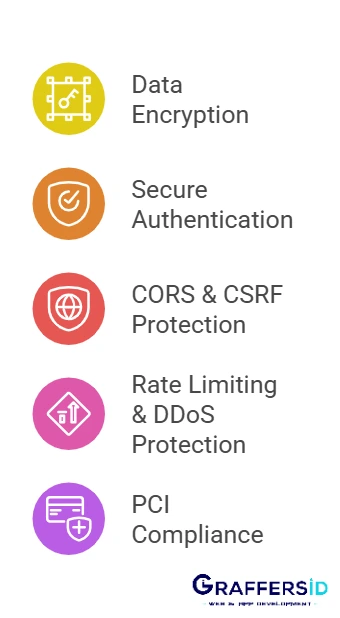
Best Security Practices for MERN Stack E-Commerce Websites in 2026
- Data Encryption: Make use of bcrypt for hashing passwords and AES-256 for securing sensitive information.
- JWT/OAuth2 Authentication: For authentication, use JWT (JSON Web Tokens) or OAuth2, which will manage user sessions securely.
- CORS & CSRF Protection: Protect your website and users from any cross-origin attacks by integrating appropriate policies for safety in Express.js.
- Rate Limiting & DDoS Protection: Helmet.js, along with rate-limiting middleware, can be deployed to curb suspicious activities.
- PCI DSS Compliance: There are certain security compliances, like PCI DSS (Payment Card Industry Data Security Standard), that need to be complied with for safe payment processing.
- AI-powered threat detection: Detect fraudulent transactions in real time.
Read More: How to Build an AI Chatbot in 2026: Types, Tech Stack & Step-by-Step Guide
Step-by-Step Guide to Building an E-Commerce Website with MERN Stack
-
Set up Backend (Node + Express): Create APIs for products, users, and orders.
-
Configure Database (MongoDB): Design schema for catalogs, users, carts, and transactions.
-
Develop Frontend (React + Next.js): Build a responsive UI with SEO-friendly rendering.
-
Add Authentication: Implement JWT/OAuth2, biometrics, or social logins.
-
Integrate Payments: Add Stripe, PayPal, or Razorpay with secure flows.
-
Implement AI Features: Recommendation engines, chatbot support, and fraud detection.
-
Test & Deploy: Use CI/CD pipelines, load testing, and monitoring tools.
Final Thoughts: Why MERN is the Best Choice for E-Commerce?
In 2026, businesses can no longer rely on outdated web architectures to meet customer expectations. The MERN stack (MongoDB, Express.js, React.js, Node.js) stands out as a future-proof foundation for building AI-powered, scalable, and high-performance e-commerce platforms.
- MongoDB enables dynamic product catalogs and real-time inventory updates.
- Express.js + Node.js ensure lightning-fast performance and secure transactions.
- React.js delivers responsive, personalized, and SEO-friendly user experiences.
AI integrations bring smart recommendations, predictive analytics, and fraud prevention to life.
By combining speed, flexibility, and intelligence, the MERN stack gives e-commerce brands everything they need to scale confidently in the AI era.
Ready to build your next-generation e-commerce website?
Partner with GraffersID, a trusted development company helping global businesses build AI-driven, full-stack e-commerce solutions using the MERN stack.
Hire expert AI developers from GraffersID to bring your digital commerce vision to life faster, smarter, and future-ready.
